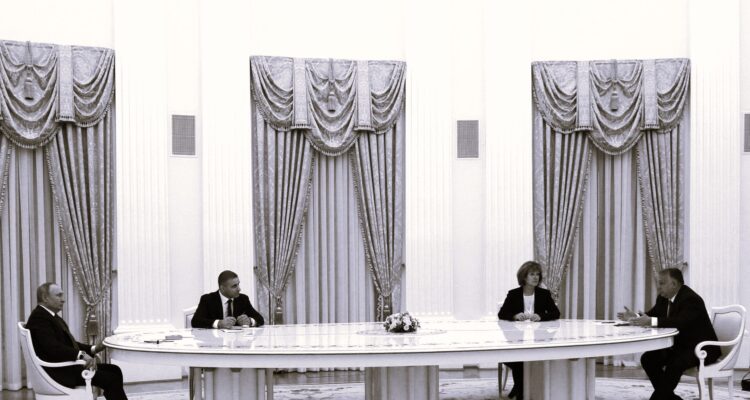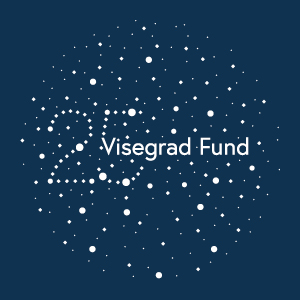21. února, 2025 Júlia Lilian Szabó
 Viktor Orbán (right) during a meeting with Vladimir Putin
at a time when the Kremlin ruler was morbidly afraid of covid.
Photo: Wikimedia Commons/Kremlin.ru
Viktor Orbán (right) during a meeting with Vladimir Putin
at a time when the Kremlin ruler was morbidly afraid of covid.
Photo: Wikimedia Commons/Kremlin.ru
As soon as Orbán began his second term as Prime Minister in 2010, he announced the Fidesz-KDNP government’s intention to strengthen ties with Putin’s Russia. Orbán felt “an Eastern wind blowing in the world economy” and saw in his mind’s eye the coming of a new world order. State visits to Russia picked up, Hungary signed consequential bilateral deals, such as the expansion of the Paks nuclear power plant with a Russian loan, increasing the country’s energy and financial dependence on Russia.
In Orbán’s diagnosis, there was a realignment on the world stage, “the West” was in economic as well as in civilisational decline, and to “stop the sinking”, building economic ties with “the East” was a necessity. What he also suggested was that success in the new world would be a question of a country’s ability to build an illiberal order within its reach. It thus became clear that Orbán found with Vladimir Putin a common enemy in the form of the normative agenda of the European Union, an enemy that has united them ever since.
A few months before the 2022 national election, Fidesz was not performing spectacularly in the polls, but at last, capitalising on the anxieties induced by a war next door, the propaganda machine revamped the winning formula of masquerading as the saviour of the Hungarian people. This time from a war that Fidesz’s united opposition backed by Brussels (backed by Soros) was “trying to drag the country into”. Orbán became the face of peace and warned that “Brussels” sought to destroy the country’s economy and energy supply with its sanctions against Russia. Fidesz turned the election into a question of life and death and won.
The resounding election victory did not soften Orbán’s rhetoric. Orbán began to threaten with a veto on EU sanction packages dashing any hopes of a swift and united European response to the war. But with a €50 billion financial aid package for Ukraine and the extension of the 15th sanctions package against Russia, all agreed to by Hungary, it seems that Orbán falls in line in the end. But he does buy time for Putin as he wheedles out sometimes absurd concessions from the EU, such as the removal from the sanctions list of Patriarch Kirill, who has been driving home the message that Russia’s aggression is a “holy war” against “Western satanism”.
Most importantly, however, with the whole of Europe watching Orbán’s every move on the Ukraine question, he has been able to introduce into public discourse the narrative of the war that is most favourable to the aggressor: support for Ukraine means support for the war.
Instead of stretching Hungary’s “Eastern opening” beyond its limits, Putin’s war against Ukraine has served as a mutual legitimation platform for Orbán and Putin and provided ammunition for the illiberal regime. Orbán has been able to turn all of his political opponents into “warmongers” and has derived a newfound legitimacy from the endlessly simplified dichotomy of war and peace. With the renewed “necessity” to ensure the security of Hungarians, Orbán found a new basis for extending the legal “state of danger” which is essentially a state of rule by decree.
The war has also raised the stakes on the European scene, where Putin and Orbán have long shared an interest in undermining the liberal democratic consensus. Orbán’s calculation seems to be that his maverick politics in the context of Putin’s war allow him more room for illiberal manoeuvre. Orbán’s response to the war, when consensus was most needed, has put a further strain on the already uneasy relationship with the EU that has resulted from Orbán’s constant testing of the EU framework.
Russian-style attacks on civil society and independent media under the banner of „the protection of sovereignty“ have gained new momentum. Last year, the government set up the Sovereignty Protection Office (with access to the secret services), which can investigate individuals and organisations that participate in public life and receive foreign funding, including money from the EU. The Office does not consider it a priority to investigate Russian influence, even in the face of attacks like the hacking of the Foreign Ministry’s servers by Russian hackers just before the last elections. In the view of the Office, which echoes the government narrative, it comes as no surprise that Hungary’s sovereignty is most at risk from actors critical of the government.
At the same time, the government not only fails to act against Russian disinformation activities, but through the media empire it controls, it consistently identifies pro-Ukraine positions as pro-war. Thus, Putin’s destabilisation activities and the related information warfare are taking effect within the Union with the active assistance of a member state. In parallel, while the regime has started to show signs of erosion, the same destabilisation has given momentum for further expansion of Orbán’s autocratisation back home.
The jury is still out on whether Orbán’s reaction to the war in Ukraine has increased the chances of the long-term survival of the regime. Had it not been for Orbán’s hand-wringing over Ukraine, for example, it is not clear whether the EU would have found the political will to trigger the conditionality mechanism and put financial pressure on the Hungarian government. Hungary’s access to EU cohesion funds and the Recovery and Resilience Facility is now tied to the fulfilment of various institutional requirements that would bring the country closer to instantiating the values of the rule of law and democracy enshrined in Article 2 of the Treaty on European Union. With Orbán currently undermining even the trace of judicial independence, for example, will the money be forthcoming?
While Orbán has been able to spin the war to ensure yet another sweeping election victory, and branding his opponents as warmongers has given him some room for manoeuvre, the truth is, Hungary needs the frozen EU funds. The Hungarian economy is not in good shape, and it seems that voters are not entirely buying the government’s narrative that the warmongering West is to blame for the country’s economic woes. None of this is good news for Orbán in a political environment where, for the first time, he faces a threatening opponent in Péter Magyar, whose meteoric rise has transformed the opposition landscape. With Orbán out of town on a global peace tour, Magyar has managed to raise the relative weight the public ascribes to, among other things, the crumbling Hungarian healthcare system and other worldly things. Orbán has been repeating the slogan that people have had enough of the war. No doubt, he is considering the possibility that it might be true, and it could play out differently than he would have hoped.
The war has given the pretext for Orbán’s unwavering support for Donald Trump. Orbán has put all his bets on Trump returning to office, and he certainly seems to believe that he now has a friend in the White House. By framing Trump as the pro-peace candidate, Orbán has woven him as an ally into his tale of European decline under the “warmonger Brusselites”.
What will come of this friendship remains to be seen. Orbán has already had to explain how his pro-peace candidate’s decision to ramp up sanctions against Russia fits into the construction of sanctions as support for war. His conclusion, which will probably go down as one of Orbán’s less smooth rhetorical feats, was that Trump wants to achieve peace with sanctions, while Brussels would like to see sanctions instead of peace.
Sanctions notwithstanding, Orbán has made clear what his number one ‘foreign policy’ goal is: to banish the “troops of Soros” who are currently stationed in Brussels. In this, he does have a friend in the White House. Trump’s announcement of cutting USAID has already dealt another blow to Hungarian independent media and civil society organisations struggling for survival. With this move, Trump has allowed Orbán a step closer to his dream of eliminating organisations that are “working against Hungarian sovereignty”. Orbán’s peace candidate and Putin together fuel Orbán’s efforts to tighten his grip on the country, and he sincerely hopes, and no doubt will do what he can, to ensure that the patriots of Europe follow his lead.
The article was written in the framework of the project Reflections of the War in Ukraine in Visegrad Countries. The project is co-financed by the governments of Czechia, Hungary, Poland and Slovakia through Visegrad Grants from the International Visegrad Fund. The mission of the fund is to advance ideas for sustainable regional cooperation in Central Europe.
